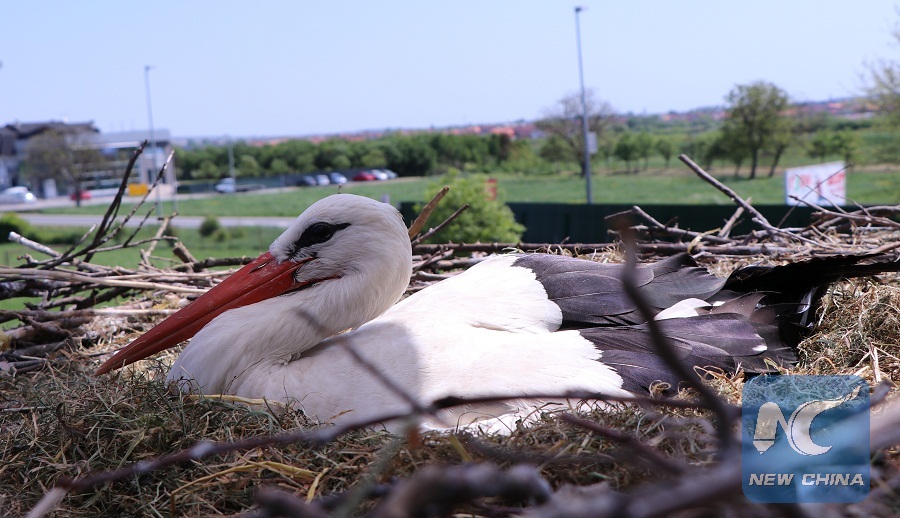
Malena, a flightless female stork, rests in its nest in the village of Brodski Varos in eastern Croatia, on April 26, 2018. Malena's "love story" with the male stork Klepetan who migrates in August every year to South Africa and returns in March for its mate in the past 15 years has grabbed media attention in recently years. (Xinhua/Relja Dusek)
by Relja Dusek
ZAGREB, April 28 (Xinhua) -- The famous "love story" between storks Malena and Klepetan who raise their young in a small village in eastern Croatia has been going on for 15 years.
On March 29, the male stork Klepetan again returned to his injured flightless mate Malena after migrating south for the winter. Despite the 13,000-km-long ordeal, the bird found its way precisely to the same nest where he left in August. But, this year, Malena was not there.
"He surprised me because I didn't expect him so early. It was cold and Malena was still in the garage. When he arrived, I instantly called Malena to come out and see who has returned," Stjepan Vokic, the man who takes care of the injured stork, told Xinhua. "They immediately started to cuddle. They arranged a nest together and now have six eggs already," Vokic said.
The story of Malena and Klepetan has earned global attention because of their unique love. It all started in 1993, when Vokic, then a school janitor, found an injured stork. She was wounded by a shot from hunters and couldn't fly so Vokic decided to take her home. He named her Malena, a Croatian word for "a small one". Ever since then he has been taking care of her. During wintertime, when storks have flown to the south, Malena stays in a heated garage where Vokic built her a nest.
In 2003, Malena met her mate Klepetan, who was named after the knocking sound storks make with their beaks. Nature instinct is stronger than love. In late summer, Klepetan will join other storks and migrate south for the winter, while Malena stays in the village of Brodski Varos in eastern Croatia with the old man who saved her life. After winter, the same instinct that pushed the stork to migrate calls him back. Although white storks usually don't pair for life, Klepetan has remained faithful and every time he comes back from the south, he comes back to Malena.
"It is a really special story about love. The way he returns each year, and how he doesn't care about her injury and the fact that they are apart for long months, it's just amazing," Vokic said. "She is so sad when he leaves. Sometimes, we watch TV together and I show her a video of her stork family: her, Klepetan and their chicks. When she sees Klepetan she starts to cry," Vokic told Xinhua.
Each year, on Aug. 28, between 2 p.m. and 6 p.m. Klepetan leaves the nest. He and other storks fly all the way to South Africa. He wears a tracking ring that reveals his route over Turkey, Lebanon, Egypt and then along the coastline of Africa to the destination near Cape Town. It is a dangers journey, especially while crossing Lebanon, where hunters await. Vokic explained that this 200 km is the highest threat to the safe return because over two million migratory birds are killed in Lebanese skies each year.
In 2017, Vokic wrote an open letter to Lebanese president, calling for efforts to prevent the murder of migratory birds and change the law to allow hunting to start only in October when the migratory birds have crossed the country.
While he is worried about Klepetan's future, he is carefully helping Malena to survive the winter. Since Malena cannot hunt, he feeds the stork every day, not only in the winter, but throughout the year. "I have to drive 30 km to the nearby river where I fish. She can eat almost a full bucket of fish a day," Vokic said while helping Malena to swallow a fish.
Vokic even built a special track to the nest. "She can land in the garden but cannot go up to the nest. I had to make a path, from the garden to the nest, so she can climb alone because I cannot be by her side all the time," Vokic said.
This year, Malena and Klepetan even became theatre stars. Their story has inspired "Zar ptica", a distinguished theater in Croatian capital Zagreb, to put on stage a childrens' play about the love of the two storks. "We did a contemporary fable about storks, long-distance love and love itself," Zelimir Mesaric, director of the play, told Xinhua.
Croatian actor Zoran Pribicevic plays Klepetan. "I'm very proud to be a part of this play. This is quite a unique story and it is very special for Croatia. It is kind of like Romeo and Juliet or Odyssey and Penelope," Pribicivec explained.

